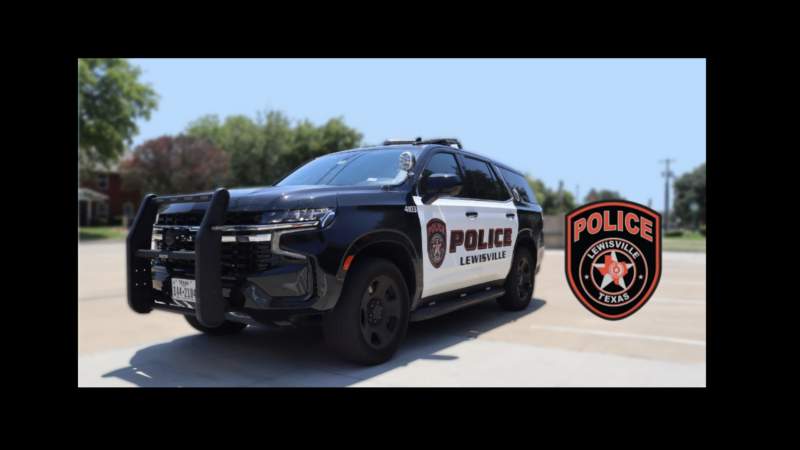Texas Cops Fired for 'Inappropriate' Sexual Contact With Massage Workers
As a result of the internal affairs investigation, three Lewisville officers were fired, one was demoted, and seven were suspended without pay.

Eleven Texas police officers have been disciplined for misconduct related to prostitution stings at massage parlors. Some of the officers are accused of inappropriate physical conduct with alleged sex workers during the stings, while others are accused of failing to stop or report this misconduct. Thirteen officers were investigated, and three wound up fired as a result.
You are reading Sex & Tech, from Elizabeth Nolan Brown. Get more of Elizabeth's sex, tech, bodily autonomy, law, and online culture coverage.
"The investigation started after the Denton County District Attorney's Office brought to my attention some concerning aspects of 23 prostitution cases that our department had filed with his office," Lewisville Police Department (LPD) Chief Brook Rollins wrote in a statement. The cases involved 28 suspects and 32 criminal charges.
The district attorney (D.A.) declined to prosecute any of them.
Is this a case of a reform-minded D.A. declining to prosecute victimless crimes? Alas, no, that doesn't seem to be what's going on here. It's more likely that the D.A. just realized these cases wouldn't cut it because of the police misconduct they involved.
Police Chief Initiates Investigations
"LPD obtained the list of cases from the DA, and we immediately began an administrative review of the declined cases. During the review of these cases, it was apparent that possible misconduct was occurring," according to Rollins, who was just appointed to the position of chief earlier this year.
Rollins opened an internal affairs investigation and also referred the cases for possible criminal investigation. (That's what we like to see!) As of November 1, no criminal charges were filed. But a "substantial" internal investigation "concluded that there had been inappropriate contact" between officers and alleged sex workers, Rollins wrote.
In the end, 11 of the 13 officers under investigation were disciplined. Not all 11 are accused of engaging in sexual misconduct. Some are accused of having violated department protocols through "ineffective supervision or communication that facilitated those incidents."
Rollins is vague about what went down, but reading between the lines it seems that officers engaged in sexual activity with massage workers, which is against LPD protocol. "Once probable cause has been established for a prostitution arrest, any further physical contact is deemed inappropriate," according to Rollins.
As a result of the internal affairs investigation, three Lewisville officers were fired, one was demoted, and seven were suspended without pay. Additionally, "two employees were given counseling entries, which is not a form of discipline," Rollins noted.
An All-Too-Common Scenario
What went down in Lewisville points to one of the many reasons why undercover prostitution stings by police officers are so wrong: They put police in a position to easily mistreat and assault sex workers.
Police are not universally prohibited from engaging in sexual conduct with suspected sex workers in order to arrest them, a situation that is in itself something in need of fixing. But a lot of departments do forbid undercover cops from such sexual activity. They're supposed to elicit an offer of sexual services for money and then make an arrest.
All too often, however, we hear about police officers who don't stop when they're supposed to. They effectively coerce women into sexual activity under false pretenses and then have the gall to put these women in handcuffs and send them off to jail afterward. They get sexual gratification at these women's expense—a situation made all the more obscene by the fact that officers often describe these women as potential victims of human trafficking.
The same week that Rollins released his statement about Lewisville officers, The Baltimore Sun reported on an "Operation Rub A Tug Tug" gone wrong. (Police seem to love giving cutesily offensive names to their sex stings.)
"As part of an investigation into alleged human trafficking and prostitution at a spa in West Ocean City, two Maryland State Police troopers went undercover as patrons in September 2019. They were told to decline any sexual acts offered by the employees," the Sun reported. "But one of them, Cpl. David Grinnan, engaged in a sexual act, after taking a pill for erectile dysfunction outside the spa, according to an internal investigation conducted by the Maryland State Police."
And of course for every instance like this that we hear about, there are likely many more that don't get brought to light. (It's quite rare to see a police chief act as swiftly, proactively, and openly as it appears Chief Rollins has done in this case.)
In my experience reporting on law enforcement and sex work, I've seen a disproportionate number of prostitution-sting misconduct cases involving massage and spa workers. This could be because a disproportionate number of stings are aimed at such establishments compared to stings aimed at street-based sex work, escort services, etc. But I suspect it also has to do with the kinds of people who tend to be employed in massage-business based sex work, an arena largely staffed by (predominantly Asian) immigrants.
Because so many massage workers are immigrants, they may be less likely than your average sex worker to have a great grasp of the English language (interpreters are often employed in the massage parlor prostitution cases that I dig into) and more likely to be undocumented or to have overstayed some sort of visa. Even in cases where all the legal documents and protocols are in order, immigrants are still more vulnerable in vice cases, since they could face deportation if arrested.
Language barriers and extra vulnerabilities make massage workers easy prey for police officers looking to get away with sexual misconduct. And it's not just local police officers with whom we see this playing out. Federal agents and their informants have also been implicated in misconduct involving massage workers.
Situations like the ones we've seen in Lewisville, West Ocean City, and countless other places highlight how bankrupt our current approach to "helping human trafficking victims" is. If these women really are in trouble, there has got to be a better way to get them services than making them jack off a cop (sometimes several times) first. And if they're neither victims nor perpetuating harm against anyone, then leave them alone.
More Sex & Tech News
• Bluesky is booming, as the relatively new social media platform gains users fleeing X. The platform has picked up more than a million new users since the election, Bluesky spokeswoman Emily Liu told The New York Times.
• "Eleven adult content companies and a trade organization say the state of Indiana's discovery requests in an age verification lawsuit are 'invasive' and 'harassing,'" the Indiana Capital Chronicle reports. "The dozen plaintiffs, which include Pornhub's parent company Aylo, want a federal judge to pause discovery until the U.S. Supreme Court weighs in on a similar case, or to extend deadlines several months."
• A Kentucky woman going by the pseudonym Mary Poe is suing over the state's strict abortion bans. Poe seeks "to strike down two abortion bans under the state constitutional rights to privacy and self-determination," notes the American Civil Liberties Union (ACLU) of Kentucky, which is representing her. "A prior lawsuit challenging the same bans was brought by abortion providers on behalf of their patients in 2022" and a trial court initially blocked the bans," but the state's attorney general appealed and the case made it to Supreme Court of Kentucky, which said "that abortion providers could not raise the constitutional rights of their patients in cases brought in Kentucky courts."
Today's Image



Show Comments (13)